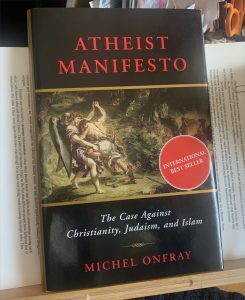Here is the most recent nonfiction book I’ve read this year; except for one, all the nf books I’ve read this year are now written up on this site.
This book was published in French in 2005, and in English in 2007, this edition from Arcade Publishing.
This book is by an author discussed in the Stephen Prothero book as being one of the “angry New Atheists” along with American and British writers Harris, Dawkins, Dennett, and Hitchens. I had heard of it before, and in fact I bought a copy in 2007 from Amazon shortly after it came out, but it’s not nearly well known in the US as the books by those others, and I had not read it until just last month. Onfray, per Wikipedia, is a prolific writer of books on many topics, though only a handful have been translated into English.
Ironically, Prothero claims Onfray is the best writer among the five, though I can’t agree — perhaps a sign of the deeper differences between what Prothero thinks are important and what I do. Onfray strikes me as extremely well-educated; he can detail historical references at the drop of a hat, and like Prothero can do so in excruciating detail; but unlike those by the famous four, his book is haphazardly organized, consisting of many short chapter sections, each pursuing one particular thought, as if the author had his main chapters in mind but otherwise made up the sections as he went along.
Further, as the subtitle states, the book is a manifesto against the three major Western religions, and deconstructs them historically, ethically, and rationally. While only indirectly, and incompletely, arguing for atheism. It’s an excluded middle situation; maybe *other* religions are true. For a “manifesto,” or paean, to accepting the universe as it is, without the incoherent filtering of religion, read the books of Carl Sagan.
Summary:
Introduction
- Author feels compassion, not anger, for those who’ve been indoctrinated. He faults those who imposed their personal mental pathology on the world for others. Moses, Paul of Tarsus, Constantine, Muhammad. Atheism is restored mental health.
- We need to return to the spirit of the Enlightenment. To lift man out of his infantile condition, to use intelligence and reason in every field, to not accept revealed truth coming from public authority.
- Author will use “atheology” (not theism) as a counterpart of theology.
Part One: Atheology
Ch1, Odyssey of the Freethinkers
- The problems of being considered a nonbeliever. The idea of atheism goes back to the bible, and included those who believed in a different god than yours. A negative term; but there is no positive one.
Ch II, Atheism and the Escape from Nihilism, p27
- Author traces back early examples of those who were accused of atheism, even if they did not deny God. Cristovao Ferreira, 1614; Jean Meslier, who attacked the church, dead in 1729. And others – all now obscure. Nothing in the universities about them.
- Then came Nietzsche, a radical post-Christian thinker. We must go beyond him—another morality, new ethics? Not nihilism.
- We may be in an era of movement, away from a religious age. The forces are not Judeo-Christian v Islam; it’s the old monotheisms vs the atheism of tomorrow. Just as the Christian era once replaced a pagan era. “Today we have conservatism, reaction, yearning for the past, and rigid religion vying with liberalism, progressivism, social reform, and movements dedicated to building a better future. Religion is anchored in tradition and cashes in on nostalgia. Philosophy looks to the future.” 38-39.
Ch III, Toward an Atheology, p41
- We are still in a Christian era. Only a few believe in the literal tenets of Catholic dogma; but many believe there is “something” more, and something after death. Atheism entails the banishing of such transcendence.
- Atheist Manifesto takes on three challenges. First: deconstruct the three monotheisms. All three share fundamentals. Priestly castes; hatred of intelligence, of life, of the here and now, of the body, and of women, p59b. Second task: deconstructing Christianity, its origins. Paul’s psychological problems. Third, deconstruction of theocracies. The cure to theocracy is democracy. These three steps are the start of building an atheology. Next will be formulating a new ethic and morality
Part Two: Monotheisms
Ch I, The Tyranny of Afterlives
- Animals don’t invent gods, but if they did we presume they would do so in their images, as humans have done. Only men create gods, driven by the attempt to avoid death. And so the religions have you die a little bit while already alive.
- Properly used, intelligence should ward off all magical thinking. Thus God forbids eating from a particular tree. Thus God desires obedience over knowledge, submitting rather than seeking. God wants you stupid and mortal. Religions live through prescriptions and constraints. An obsession with purity, contrasting the impure physical world with the idea of an ideal world. Yet why not let the lessons of cleanliness be enough, without religious prescriptions? And purification rituals. Some rules make sense, others do not: certain postures; garlic and shallots.
(will resume here tomorrow)






